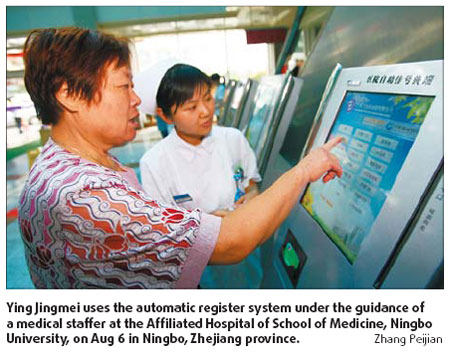
|
CHINA> News
 |
|
China speeds up healthcare reform
By Mark Hughes (China Daily)
Updated: 2009-09-10 08:38 This year China's State Council announced an allocation of $124 billion toward healthcare reform. Under the plan, by next year 90 percent of China's citizens will be covered by a universal system and facilities will be upgraded, including construction of 30,000 hospitals, clinics and care centers across the country. Instead of focusing on large "magnet" hospitals, where people can queue for up to eight hours, the government plans to build local clinics to treat smaller problems and act as hubs directing needy patients to bigger hospitals. As part of the reforms, the Chinese government has issued a list of more than 300 commonly used medicines that will be sold at controlled prices starting this month to make healthcare more affordable and efficient. Public hospitals and doctors often rely on profits from the sale of drugs and expensive treatments and tests to cover their operating expenses. The government wants to deter the over-prescribing of remedies to lessen the burden on patients and save medical resources.
 The new essential medicines list includes Western and traditional Chinese drugs that will be sold at cost price. It includes antibiotics such as amoxicillin and streptomycin, pain relievers such as aspirin and paracetamol as well as medicines for coughs, colds, anxiety and high blood pressure. The Ministry of Health aims to equip about a third of public grassroots health facilities with all the essential medicines on the list by the end of the year and reach all State-owned medical institutions by 2020. Gordon Liu, head of health economics and management at Peking University, said the list covers drugs that treat between 60 and 80 percent of the most common diseases. But Liu said the drugs policy must be accompanied by other initiatives to address how doctors and hospitals are paid for their services in order to discourage them from over-prescribing drugs. "This policy may help rationalize the use of medicine, it may help reduce the cost of medicine to some extent, but it cannot solve the whole problem," Liu said. "Doctors may still have incentives to try to find ways to compensate the loss of their medical services due to price regulations by the government." Many doctors believe they are underpaid for the amount of work they do and the stress it entails. On average Chinese doctors receive between 3,000 and 4,000 yuan a month with an extra 3,000 to 4,000 yuan in monthly bonuses. General practitioners with the National Health Service in the United Kingdom can earn more than 1 million yuan a year, the equivalent of more than 80,000 yuan a month. In the United States, non-specialist doctors receive up to $200,000 a year. Also, although raising doctors' salaries has been included in the reform, there is no agreement as yet by how much they will increase. Many agree, though, that a rise is essential. Ji Shaoliang, a professor from Beijing University of Chinese Medicine, said the reform would clamp down on possible abuse of the present system. "Under the reform plan, the Chinese government will be responsible for setting prices for the medicines included in the latest National Basic Medicine Catalogue. Provincial governments put out a tender to companies selling drugs and those that are successful will have to sell the medicine at the price fixed by the government. They will not be allowed to sell them at a higher price," he said. "In this way, there will be little motive for the pharmaceutical companies or trading companies to send sales representatives to lobby doctors over what they prescribe." To ensure doctors prescribe medicines from the new list at cost price, the authorities are mulling over a system that requires hospitals to bulk-buy a high percentage of medicines included in the catalog annually to create an expensive stockpile they will be obliged to dispense before their "use-by" date, or face unspecified sanctions. Better technology is perceived as a guardian against corrupt practices and is being rolled out across the country. Zhou Bin is managing director of Perot System, Healthcare China. He said: "The (proposed) unified IT system will help to reduce healthcare costs and make them more transparent. Every patient will have a log that records his or her illness, symptoms, prescriptions and drug doses. Therefore patients will be able to know whether they are being over-prescribed." China's Health Ministry says the new drug policy will create competition among manufacturers and lead to more mergers and acquisitions in the fragmented industry. Several drug companies will be competing to get their medicines on the preferred list. Those that succeed will have a huge commercial advantage which could give them the leverage they need to take over their rivals. "Essential drugs will be purchased through competitive bidding," said Zheng Hong, the head of medical policy and the essential drugs program at the Ministry of Health. "It's impossible for all makers of the same drug to win bids ... so the impact will be more mergers and acquisitions."
|